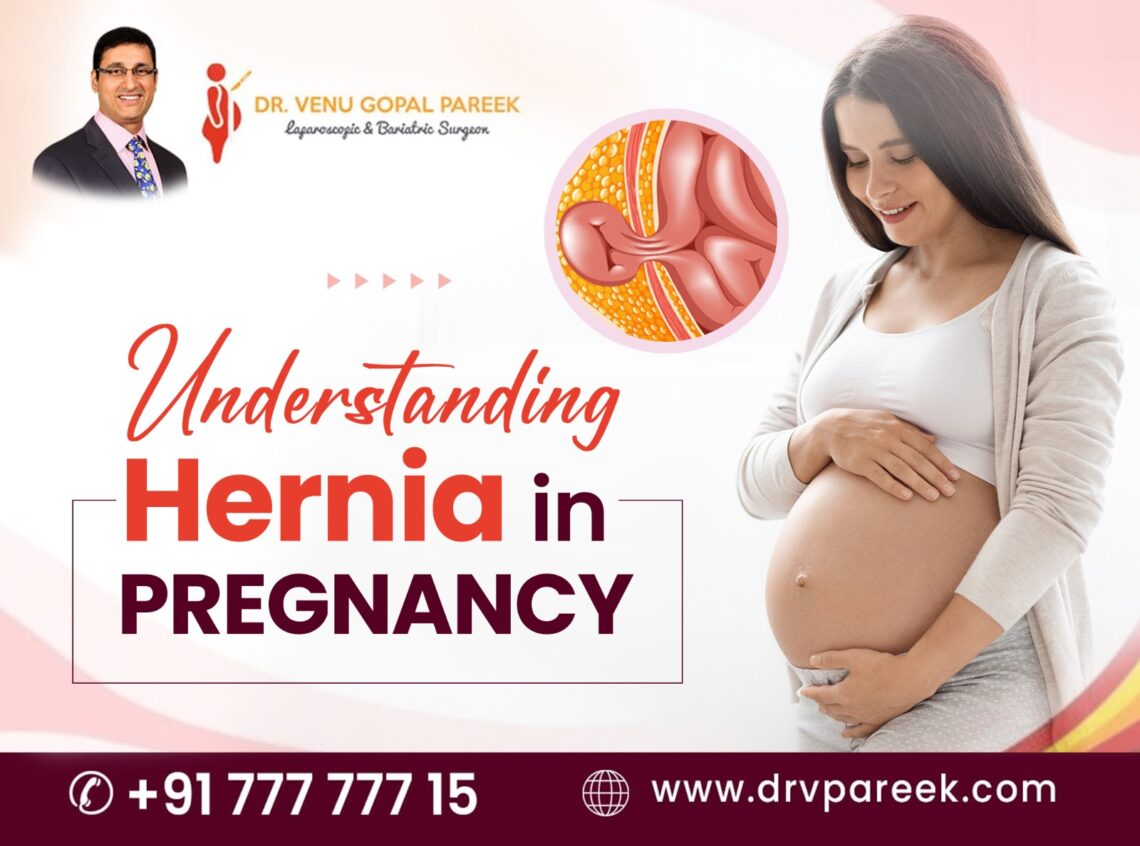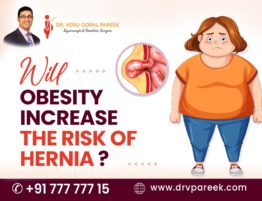
A hernia is a medical problem that develops in people of any age. It is defined as a bulge or a protrusion of internal organs through a weak area in the muscle wall. Hernias are commonly developed in the groin and abdominal areas. They often appear over the years, and most people have them as a birth defect.
Pregnant women experience increased pressure from inside the abdominal wall, which puts them at higher risk of developing hernias during pregnancy. However, a hernia that occurs during pregnancy may not be a problem unless it begins to hurt. If you think it’s not bothering you and ignore it, it might become serious and lead to potentially life-threatening complications.
Umbilical hernias, para umbilical hernias, and inguinal hernias are some of the common hernia types observed in women during pregnancy.
If you have a hernia and are trying to get pregnant or are already pregnant, inform the doctor to be checked for complications and get treated. Some hernias might not cause any complications, but in some cases, they may cause life-threatening complications. In such cases, they must be fixed before you get pregnant for healthy baby growth.
Causes of hernia during pregnancy?
Hernias develop due to a weak muscular wall or an ill-grown muscle. This condition is more likely to be a birth defect than to develop later in life. However, certain health conditions might also lead to tissue weakening, often resulting in a hernia.
One such condition is pregnancy, where women become vulnerable to developing hernias during pregnancy because of increased pressure on abdominal muscles, which makes them weak throughout pregnancy.
Here are some of the factors that may increase the risk of developing a hernia during pregnancy:
- Obesity
- Being overweight
- People having multiple babies (twins, triplets, and more)
- Prior abdominal surgery, which includes hernia repair
- Lifting heavy objects
- Chronic sneeze or cough
- Chronic constipation or other GI tract issues
- History of hernias in your family line
- Ageing
If you have a hernia, what happens during childbirth?
Most women can have a healthy delivery even with hernias. The surgeon would still advise a normal delivery as usual if the hernia appears to be small.
But in certain cases, like people who have had a previous C-section or have a large hernia, or lie low in their abdomen, the surgeon may recommend undergoing a C-section to deliver the baby.
In some rare cases, a hernia can appear immediately after baby delivery, instead of growing throughout pregnancy. This might be due to lots of pressure on the abdominal wall while pushing the baby out.
Can a hernia hurt my baby during pregnancy or labour?
No, there is no possibility of hurting your baby directly if you have a hernia during pregnancy or labour. Your baby is nestled completely inside your uterus, so a tiny opening created by the hernia in the abdominal wall might not have any direct effect on your baby.
But if you find it hard to eat or drink, consult your doctor and ensure you are getting sufficient nutrition because your baby requires plenty of nutrients for healthy growth.
Treatment options available to fix hernias during pregnancy
According to some experts, there is no ideal time to fix a hernia problem in a pregnant woman. If the hernia is small and not causing any discomfort, your surgeon might postpone hernia repair surgery until the baby is born.
However, if the hernia is causing any uncomfortable symptoms, it has to be repaired while you are still pregnant. Sometimes, emergency surgery is necessary if the hernia results in complications like strangulation or other complications.
Except in emergencies, the following treatment options can help manage your hernia during pregnancy.
Hernia surgery during pregnancy
Hernia repair surgery is considered a safe procedure, even during pregnancy. Laparoscopy is the best minimally invasive surgical option suggested to fix hernias that cause complications even during pregnancy. Some expert surgeons suggest doing surgery to fix the hernia in the first or second trimester, while others feel that the second trimester is the best.
If an abdominal hernia is treated with sutures alone, without the use of mesh to support the weaker muscle area, there is a significant risk of recurrence during pregnancy. However, using a mesh can reduce the flexibility of the abdominal wall and cause pain during pregnancy.
Laparoscopic ventral hernia repair is thought to be the safest procedure before and during pregnancy, with no major consequences for the pregnancy or delivery.
Hernia repair during a Caesarean Section (C-section)
If the hernia is not severe, the surgeon will mostly be able to fix it during the C-section simultaneously. Repairing an umbilical hernia during a C-section might not take longer than the regular C-section time. But, repairing an inguinal hernia during a C-section can take more time than it would normally.
A hernia surgery carried out during a C-section using simple sutures might put you at a higher risk of hernia recurrence than using surgical mesh, which is similar to elective hernia surgery at the time of pregnancy.
Hernia repair surgery following childbirth
If you possess a mild hernia, you or the surgeon may opt not to address it during a C-section for various reasons, one of which is for future pregnancies. Hernia repair can also be performed a few weeks after baby delivery or can wait for a year or more so that your body gets the required time to recover from pregnancy.
If you are having a hernia or have a history of hernia surgery and are now planning for pregnancy, get advice from experts like Dr. Venugopal Pareek, one of the best hernia surgeons in Hyderabad. He has more than 18 years of experience as a laparoscopic hernia surgeon in India.







